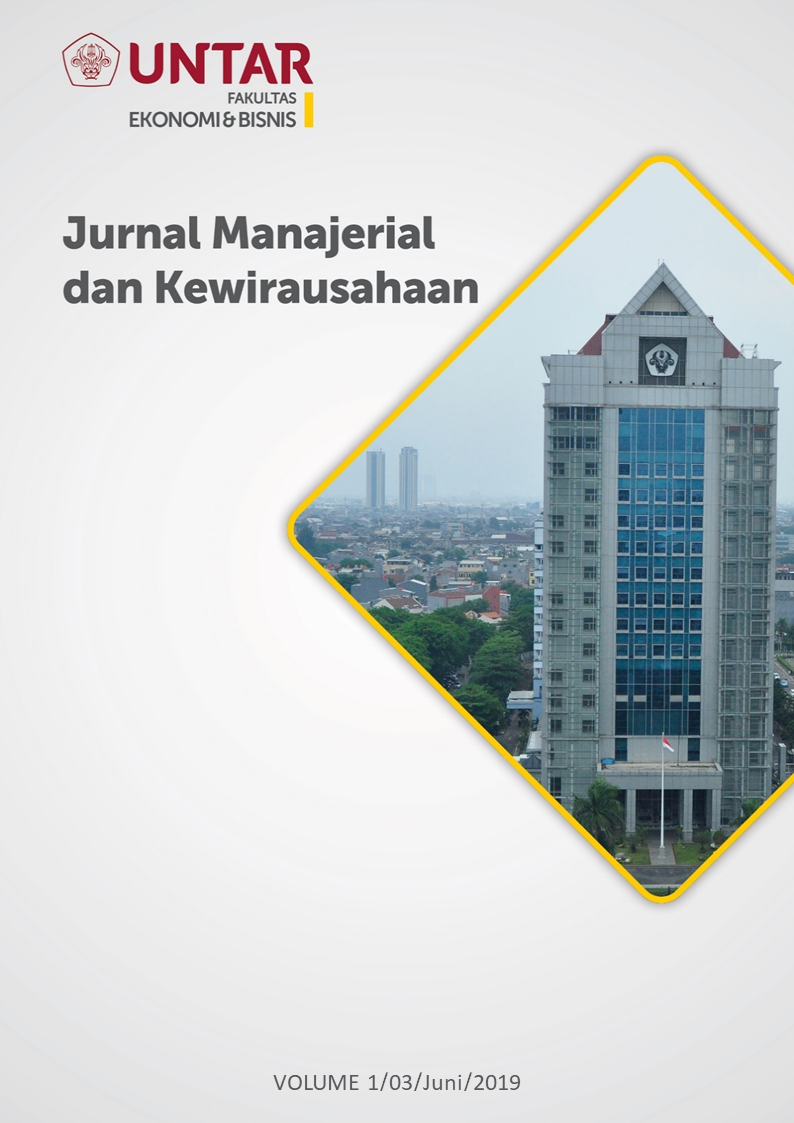Faktor Yang Mempengaruhi Cash Holding Perusahaan Manufaktur Yang Terdaftar Di BEI
Main Article Content
Abstract
The purpose of this research is to examine whether 1) firm size has an impact on corporate cash holding of manufacturing companies in Indonesia, 2) growth opportunities has an impact on corporate cash holding of manufacturing companies in Indonesia, 3) cash flow volatility has an impact on corporate cash holding of manufacturing companies in Indonesia, 4) leverage has an impact on corporate cash holding of manufacturing companies in Indonesia, 5) dividend payments has an impact on corporate cash holding of manufacturing companies in Indonesia. Sample was selected using purposive sampling method amounted to 237 observations. The result of this study shows that firm size has a significant negative impact on corporate cash holdings, growth opportunities has a non-significant positive impact on corporate cash holdings, cash flow volatility has a non-significant negative impact on corporate cash holdings, leverage has a significant negative impact on corporate cash holdings, and dividend payments has a non-significant negative impact on corporate cash holdings
Tujuan dari penelitian ini adalah untuk menganalisis apakah 1) ukuran perusahaan berpengaruh terhadap jumlah kas yang dipegang perusahaan manufaktur di Indonesia, 2) peluang pertumbuhan berpengaruh terhadap jumlah kas yang dipegang perusahaan manufaktur di Indonesia, 3) volatilitas arus kas berpengaruh terhadap jumlah kas yang dipegang perusahaan manufaktur di Indonesia, 4) tingkat hutang berpengaruh terhadap jumlah kas yang dipegang perusahaan manufaktur di Indonesia, 5) pembayaran dividen berpengaruh terhadap jumlah kas yang dipegang perusahaan manufaktur di Indonesia. Sampel yang diteliti sejumlah 237 observasi dipilih dengan metode purposive sampling. Hasil penelitian ini menunjukkan bahwa ukuran perusahaan memiliki pengaruh negatif yang signifikan terhadap jumlah pemegangan kas, peluang pertumbuhan memiliki pengaruh positif yang tidak signifikan terhadap jumlah pemegangan kas, volatilitas arus kas memiliki pengaruh negatif yang tidak signifikan terhadap jumlah pemegangan kas, tingkat hutang memiliki pengaruh negatif yang signifikan terhadap jumlah pemegangan kas, dan pembayaran dividen memiliki pengaruh negatif yang tidak signifikan terhadap jumlah pemegangan kas.
Article Details
This work is licensed under a Jurnal Muara Ilmu Ekonomi dan Bisnis Creative Commons Attribution-ShareAlike 4.0 International License.,/p>
References
Ali, A., and Yousaf, S. (2013). Determinants of cash holding in German market. Journal of
Business and Management, 12(6), 28-34.
Anjum, S., and Malik, Q. A. (2013). Determinants of corporate liquidity-An analysis of cash
holdings. Journal of Business and Management, 7(2), 94-100.
Bates, T. W., Kahle, K. M., and Stulz, R. M. (2009). Why do US firms hold so much more cash
than they used to? The journal of finance, 64(5), 1985-2021.
Dechow, P. M., and Dichev, I. D. (2002). The quality of accruals and earnings: The role of accrual
estimation errors. The accounting review, 77(s-1), 35-59.
Deloof, M. (2003), “Does Working Capital Management Affect Profitability of Belgian Firms?
Journal of Business Finance and Accounting, 30(3), 573-587.
Dittmar, A., Mahrt-Smith, J., and Servaes, H. (2003). International corporate governance and
corporate cash holdings. Journal of Financial and Quantitative analysis, 38(1), 111-
Ferreira, M. A., and Vilela, A. S. (2004). Why do firms hold cash? Evidence from EMU
countries. European Financial Management, 10(2), 295-319.
Gill, A., and Shah, C. (2012). Determinants of corporate cash holdings: Evidence from
Canada. International Journal of Economics and Finance, 4(1), 70.
Kasmir. (2012). Analisis Laporan Keuangan. Raja Grafindo, Jakarta.
Kim, J., Kim, H., and Woods, D. (2011). Determinants of corporate cash-holding levels: An
empirical examination of the restaurant industry. International Journal of Hospitality
Management, 30(3), 568-574.
Myers, S. C. (1984). The capital structure puzzle. The Journal of Finance, 39(3), 574–592.
Opler, T., Pinkowitz, L., Stulz, R., and Williamson, R. (1999). The determinants and implications
of corporate cash holdings. Journal of financial economics, 52(1), 3-46.
Ozkan, A., and Ozkan, N. (2004). Corporate cash holdings: An empirical investigation of UK
companies. Journal of Banking & Finance, 28(9), 2103-2134.
Shabbir, M., Hashmi, S. H., and Chaudhary, G. M. (2016). Determinants of corporate cash
holdings in Pakistan. International Journal of Organizational Leadership, 5(1), 50.
Titman, S. and Wessels, R. (1988). The Determinant of Capital Structure Choice, The Journal of
Finance. 43 (1), 1-19
Trigueiro, D. (2000). A theoretical definition and statistical description of firm size. Paper accepted
to be presented at the annual 37 conference of the British accounting association. Retrieved
from:
http://home.iscteiul.pt/~dmt/publ/2000_A_theoretical_definition_and_statistical_descripti
on_of_firm_size.pdf
Uyar, A., and Kuzey, C. (2014). Determinants of corporate cash holdings: evidence from the
emerging market of Turkey. Applied Economics, 46(9), 1035-1048.
Wasiuzzaman, S. (2014),"Analysis of corporate cash holdings of firms in Malaysia", Journal of
Asia Business Studies, Vol. 8 Iss 2 pp. 118 – 135.



